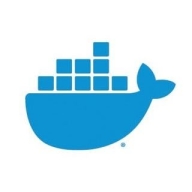

Find out in this report how the two Software Supply Chain Security solutions compare in terms of features, pricing, service and support, easy of deployment, and ROI.


Docker is a versatile container platform used for running and deploying applications in isolated environments, ensuring consistency across development, testing, and production.
Docker offers solutions for containerizing applications, automating deployments, and managing infrastructure through its robust platform. It supports CI/CD workflows, provides a development platform for container management, and simplifies the setup by using streamlined tools. Organizations leverage Docker for building microservices, running UI applications, deploying web services, and setting up secure environments. It also facilitates managing containers via Kubernetes and creating development stacks for enhanced productivity.
What are Docker's key features?Industries implement Docker for CI/CD pipelines, scaling services, and improving resource utilization. Tech companies use Docker for building and deploying their software in isolated environments. Finance and healthcare sectors deploy applications securely, ensuring compliance with regulatory standards. Educational institutions set up consistent development environments for coding labs and training students in advanced technologies.
Mend.io is a software composition analysis tool that secures what developers create. The solution provides an automated reduction of the software attack surface, reduces developer burdens, and accelerates app delivery. Mend.io provides open-source analysis with its in-house and other multiple sources of software vulnerabilities. In addition, the solution offers license and policy violation alerts, has great pipeline integration, and, since it is a SaaS (software as a service), it doesn’t require you to physically maintain servers or data centers for any implementation. Not only does Mend.io reduce enterprise application security risk, it also helps developers meet deadlines faster.
Mend.io Features
Mend.io has many valuable key features. Some of the most useful ones include:
Mend.io Benefits
There are many benefits to implementing Mend.io. Some of the biggest advantages the solution offers include:
Reviews from Real Users
Below are some reviews and helpful feedback written by PeerSpot users currently using the Mend.io solution.
Jeffrey H., System Manager of Cloud Engineering at Common Spirit, says, “Finding vulnerabilities is pretty easy. Mend.io (formerly WhiteSource) does a great job of that and we had quite a few when we first put this in place. Mend.io does a very good job of finding the open-source, checking the versions, and making sure they're secure. They notify us of critical high, medium, and low impacts, and if anything is wrong. We find the product very easy to use and we use it as a core part of our strategy for scanning product code moving toward release.”
PeerSpot reviewer Ben D., Head of Software Engineering at a legal firm, mentions, “The way WhiteSource scans the code is great. It’s easy to identify and remediate open source vulnerabilities using this solution. WhiteSource helped reduce our mean time to resolution since we adopted the product. In terms of integration, it's pretty easy.”
An IT Service Manager at a wholesaler/distributor comments, “Mend.io provides threat detection and an excellent UI in a highly stable solution, with outstanding technical support.”
Another reviewer, Kevin D., Intramural OfficialIntramural at Northeastern University, states, "The vulnerability analysis is the best aspect of the solution."
We monitor all Software Supply Chain Security reviews to prevent fraudulent reviews and keep review quality high. We do not post reviews by company employees or direct competitors. We validate each review for authenticity via cross-reference with LinkedIn, and personal follow-up with the reviewer when necessary.